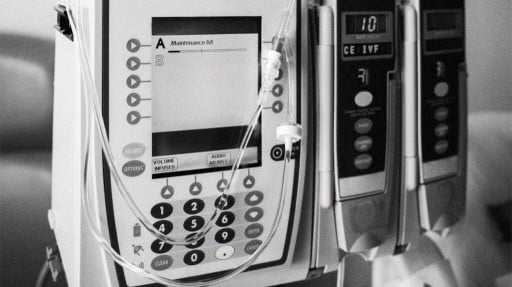Semaglutide overdose: What are the symptom and treatments?

- Poison control centers across the United States are witnessing a concerning increase in inquiries related to semaglutide, an injectable medication used for diabetes management and weight loss.
- Reports of inadvertent overdoses have led to hospitalizations in some cases, with symptoms including intense nausea, vomiting and abdominal discomfort.
- Data from America’s Poison Centers reveals a startling 15-fold increase in semaglutide-related calls between January and November, primarily attributed to dosage errors, amid concerns over the safety of compounded formulations of the drug.
Semaglutide, a glucagon-like peptide-1 receptor agonist or GLP-1 analog, gained approval from the Food and Drug Administration (FDA) in 2017.
The medicine is marketed as Ozempic for diabetes management and Wegovy for weight loss.
In 2023, from January to November, America’s Poison Centers have reported recording nearly 2,941 calls related to semaglutide, marking a more than 15-fold increase compared to 2019.
In 94% of these cases, semaglutide was the sole reported substance involved.
Fortunately, these cases have demonstrated resolution following treatment involving intravenous fluids and anti-nausea medications.
Semaglutide for diabetes management or weight loss
Following the endorsement of Ozempic by celebrities on social media in 2022 for weight loss, there was a surge in demand that outpaced the available supply.
Consequently, the drug was recorded as being
This shortage opened the door for select pharmacies with appropriate qualifications to produce compounded versions of the drug.
These compounded formulations of semaglutide often diverge from the patented drug and frequently incorporate semaglutide salts, specifically semaglutide sodium and semaglutide acetate.
The FDA has
Consequently, they do not qualify for the compounding exemption granted to drugs facing shortages under the law.
In certain instances, compounded versions are marketed in unapproved dosage strengths.
The FDA has initiated legal action by issuing warning letters to at least two online retailers, urging them to cease distribution of these unapproved versions.
Lawsuits against clinics marketing unapproved formulations
Pharmaceutical manufacturer Novo Nordisk has also filed lawsuits against six entities, including medical spas, medical clinics and weight loss clinics, seeking to prohibit the sale of these knock-off semaglutide formulations.
It is important to understand that all medicines must go through clinical trials to assess their safety and efficacy.
Any changes to formulations of an approved medicine must also follow strict procedures to ensure they remain safe and efficacious.
Despite these regulatory concerns, compounded versions remain popular, primarily due to their potential for reduced out-of-pocket costs, particularly in cases where insurance coverage is unavailable.
The FDA took a public stance against the use of compounded semaglutide formulations in June, advising against their usage when prescription forms of the medication are accessible.
The agency cited adverse event reports it had received following the use of compounded semaglutide.
Are adverse events linked to patented or compounded drugs?
Poison control centers find it challenging to identify whether the reported symptoms are linked to the patented medications or the compounded versions.
However, some state poison center directors express the belief that many of these calls are attributable to the compounded formulations.
There is no specific antidote available for countering a semaglutide overdose.
Semaglutide has a relatively long half-life of approximately one week, meaning it takes a week to eliminate half of the drug from the body.
Consequently, emergency departments and hospitals can only provide supportive care to patients, administering intravenous fluids and anti-nausea medications while the drug gradually metabolises and exits their system.
What are the signs of a semaglutide overdose?
Medical News Today spoke to three experts about the surge in semaglutide-related adverse events.
“Usually, this resolves on its own, but in large overdoses, the symptoms can be persistent causing patients to become severely dehydrated requiring IV fluids and anti-nausea medication,” Dr. Ross explained.
“Other symptoms include low blood sugar or low blood pressure which can give you a headache or make you confused, lightheaded, dizzy, or even faint. Low blood sugar may make some people jittery, irritable, and even aggressive.”
– Dr. Jared L. Ross
“Most of these brand-name medications are supplied in pre-filled injection pens, similar to how many people use insulin, making overdose rare,” he also noted.
Why are people overdosing on semaglutide?
“However,” Dr Ross warned, “due to the current high demand and short supply of these medications compounding pharmacies are allowed to sell the medication in vials. With very small doses being typical, often 0.05-0.1 ml [mililiters], it is easy for patients to make mistakes and draw up too much, even 10-fold overdoses are common. With the exception of some doses of Ozempic, these pre-filled pens deliver a fixed dose making overdose rare.”
“Previously, this medication was only FDA approved for type 2 diabetics. These patients are seen more frequently in the clinic and have regular blood sugar monitoring. However, recently these medications have gained increasing popularity for weight loss,” Knese noted.
“If patients do not follow the medication instructions and are giving doses higher than recommended this will more likely lead to negative outcomes/overdose. Education should always be provided to patients on correct storage, use and side effects, especially symptoms of low blood sugar,” she advised.
Significant public health concern
“For patients, it highlights the need for thorough education on the proper use of these medications, understanding the risks and recognizing overdose symptoms,” he told us.
“For the public and healthcare system, it underscores the importance of careful prescribing practices, monitoring of drug use, and raising awareness about the potential risks associated with these medications. Additionally, it calls for research into safer, more effective treatments for diabetes and obesity and strategies to prevent medication misuse.”
Dr. Zeeshan Afzal
Dr. Ross urges anyone who may be experiencing an overdose to seek medical care right away.
“You can reach your local poison control center by calling 1-800-222-1222 [in the United States]; they can help you determine if you need to go to the emergency room. If you are concerned, call 911 or go to the nearest hospital,” Dr. Ross advised.
America’s Poison Centers also encourage people to contact their Poison Help phone number and to use their website as a resource, saying, “for poisoning related-related questions, or if you need emergency assistance please contact Poison Help at 1-800-222-1222 or visit PoisonHelp.org.”








:max_bytes(150000):strip_icc()/GettyImages-1771217813-9e0555900ac446418196644579610998.jpg)

